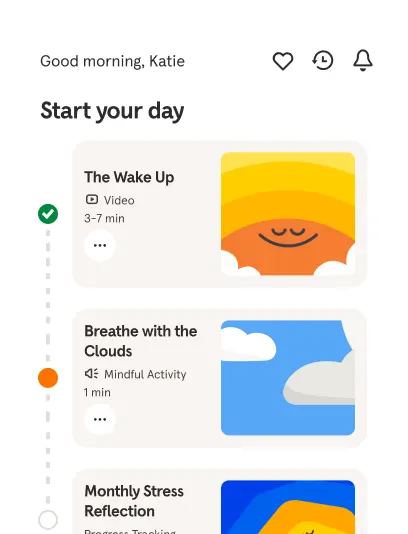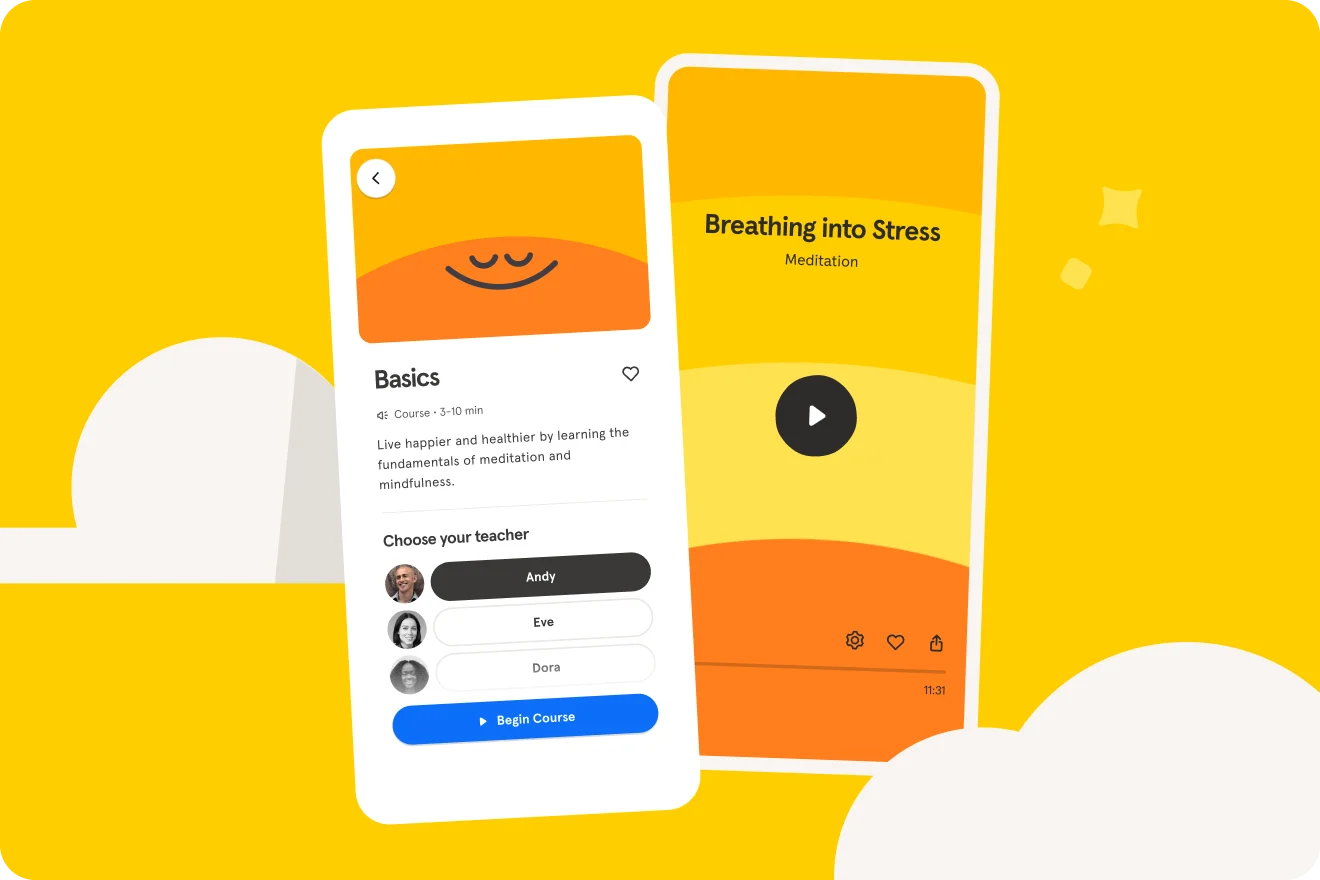Better mental health starts with Headspace. Unrivaled expertise to make life feel a little easier, using guided meditations, mindfulness tips, focus tools, sleep support, and dedicated programs.
Try 14 days free
Whatever we choose to call it, whether we call it anger or frustration, impatience, irritability, I would put them all under the same umbrella for this context. Those things when they arise, they have the potential to disrupt and to throw us off course. But if we know how to approach them in the right way, then they can even be helpful. And knowing that, I think, can bring a greater sense of confidence to your practice and ultimately more benefit from the exercise itself. So regardless of whether you're aware of the anger before your Headspace session or whether you become more aware of it during the session, we still kind of look to approach it in the same way. So if you're feeling angry before you've even sat down, it's good to at least be aware of that. It sounds obvious, and we think we would be aware of it, but sometimes we're actually not aware of the anger. Instead, we're caught up in the conversation which is exacerbating the anger. It's kind of fueling or fanning the flames of anger. It's keeping it alive. But if we are conscious and aware that there is a strong momentum of anger already kind of present even when we sit down, then we know in advance not to expect the mind to be immediately quiet and calm. So otherwise we sit down and it's like, well, why don't I feel calm? And we start getting angry at ourselves or at the practice. But if we know in advance, then in terms of expectation setting, we're a little bit more okay with, okay, well, there's a feeling of anger. That's probably gonna take a little while just to work its way out of the system. So that's a really important point. When we are sitting down, though, during the exercise and it starts to arise, and it can... We can experience it in many different ways. For some people, it's more of a physical thing. We might feel a tightness in the chest. Some people even say they kind of feel pins and needles in their fingers and their toes. It can be tightness in the shoulders around the throat, the neck, the jaw. Or it might be more of a sort of a less tangible feeling, if you like. We'd probably call it an emotion. We're not necessarily aware of the physical aspect of that emotion, but there is just a sense of feeling very, say, frustrated or impatient or irritable in some way. Now the temptation whenever an emotion is running kind of strongly like this is to disappear into it. Already there is a strong conversation in the mind. There has to be in order for the emotion to maintain itself. So we tend to sort of get caught up in the conversation. Obviously, that leads to just a greater feeling of anger. The alternative is to sit down and think, oh, I shouldn't be feeling angry. I...
Details
About your teachers
- More about Andy
A former Buddhist monk, Andy has guided people in meditation and mindfulness for 20 years. In his mission to make these practices accessible to all, he co-created the Headspace app in 2010.
- More about Eve
Eve is a mindfulness teacher, overseeing Headspace’s meditation curriculum. She is passionate about sharing meditation to help others feel less stressed and experience more compassion in their lives.
- More about Dora
As a meditation teacher, Dora encourages others to live, breathe, and be with the fullness of their experiences. She loves meditation’s power to create community and bring clarity to people’s minds.
- More about Kessonga
Kessonga has been an acupuncturists, therapist, and meditation teacher, working to bring mindfulness to the diverse populations of the world.
- More about Rosie
Rosie Acosta has studied yoga and mindfulness for more than 20 years and taught for over a decade. Rosie’s mission is to help others overcome adversity and experience radical love.

Your lifelong guide to better mental health
Stress, sleep, and all the challenging emotions — care for your mind with the everyday mental health app that's shown to make a difference.
Try 14 days free
Look after your mind
Proven guided meditations and programs to help you stress less, sleep more soundly, and better navigate life’s challenges

Science-backed
Studies show that using Headspace for 30 days can reduce stress, increase resilience, and improve overall well-being

Explore 1000+ expert-led exercises
Access our library of meditations, breathing exercises, and guidance videos for stress, sleep, focus, everyday anxiety , parenting, and more.
Member reviews
Hear from some of our members
Your app brings so much peace and tolerance to our home.
Rachel
UK
Changing my thoughts has allowed me to change my life.
Davide
London
The stress and loneliness courses … taught me how to comfort myself.
Alicia
Canada
Headspace provides me with … a connection to myself, and a disconnection from negative thoughts, feelings, and sensations.
Keri
UK
Related to 'Anger'
- © 2024 Headspace Inc.
- Terms & conditions
- Privacy policy
- Consumer Health Data
- Your privacy choices
- CA Privacy Notice

